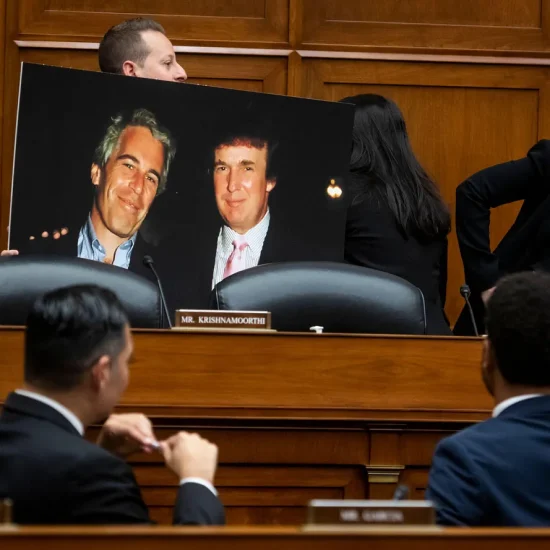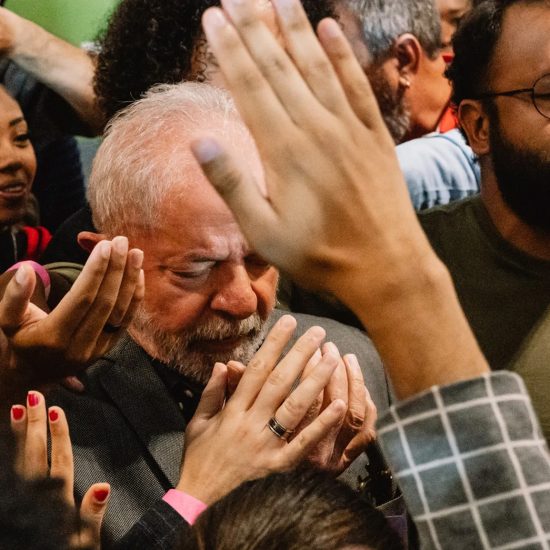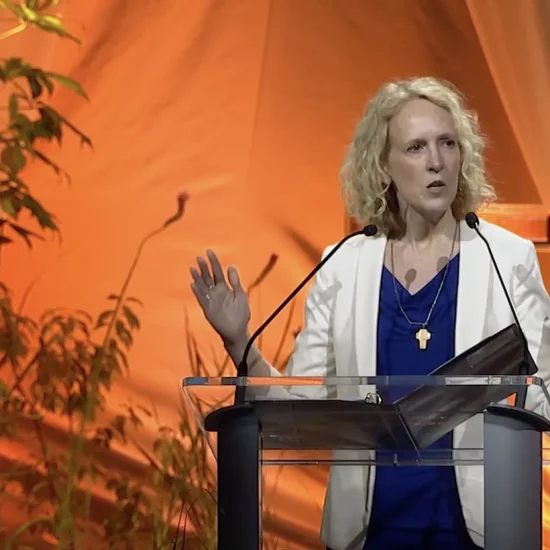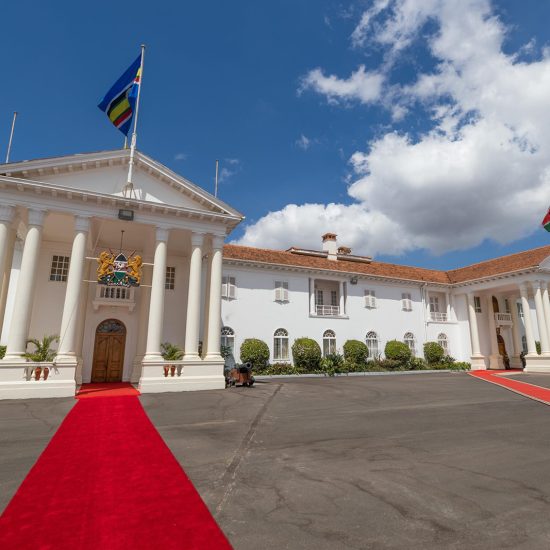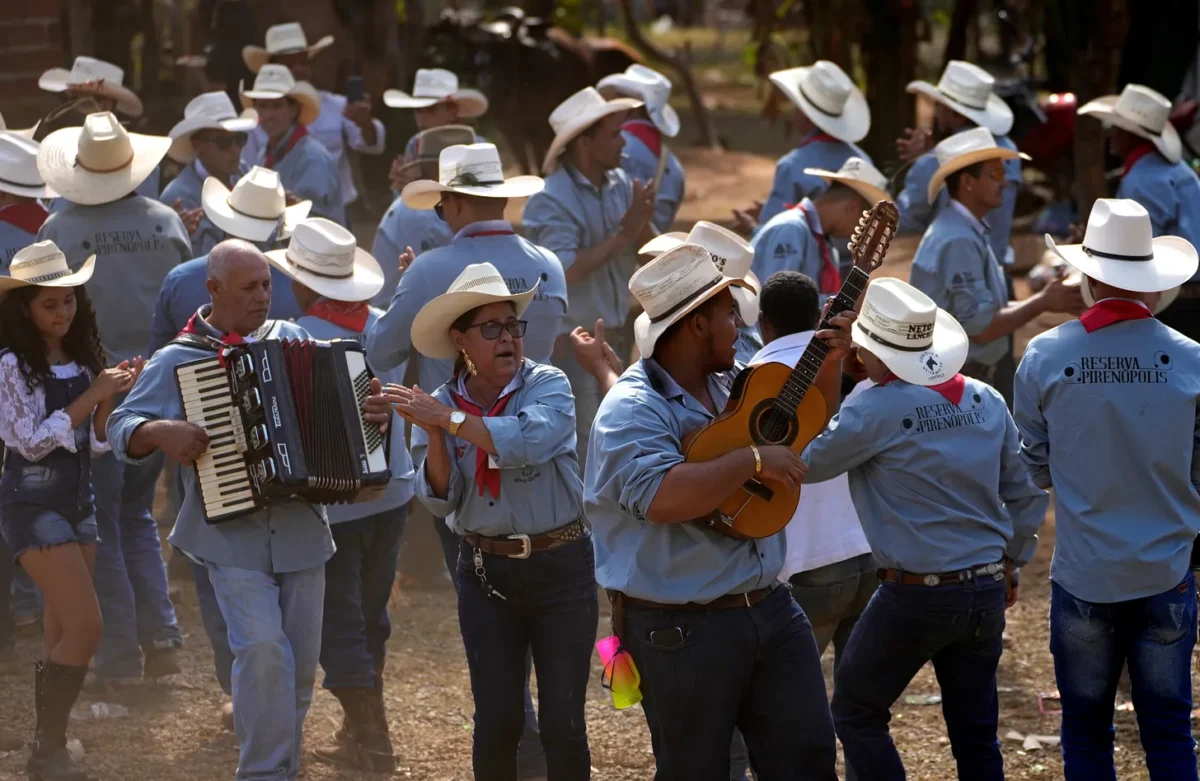
The MAGA pope wants to add a new sacred day to the calendar. And like other ideas he pushes, it’s all about him. At a rally in Green Bay, Wisconsin, that opened last week with a call to “save America,” Donald Trump complained about President Joe Biden recognizing Transgender Visibility Day on the same day as Easter, even though both dates were set by others.
“We are going to save our country,” Trump declared after coming on stage to Lee Greenwood’s “God Bless the USA” just days after Trump promoted Greenwood’s “Bible” bearing that song’s title. “What the hell was Biden thinking when he declared Easter Sunday to be Trans Visibility Day? Such total disrespect to Christians. And Nov. 5 is going to be called something else. You know what it’s going to be called? ‘Christian Visibility Day,’ when Christians turn out in numbers that nobody has ever seen before. Let’s call it ‘Christian Visibility Day.’”

Trump reiterated his desire to make Nov. 5 “Christian Visibility Day” on his Truth Social platform on Sunday. While his proposal drew cheers and applause from the faithful gathered in Green Bay, it also sparked political headlines and jokes from late-night comics.
“This is America, buddy, every day is ‘Christian Visibility Day,’” Desi Lydic exclaimed on The Daily Show before adding jokes about Trump as a Bible salesman.
“Yes, finally, a Christian holiday we can celebrate,” declared Jimmy Kimmel. “I love that he’s somehow the Christian candidate. Trump, not only does he not go to church, he didn’t even go to church on Easter Sunday.”
Although Trump’s call for a “Christian Visibility Day” does seem like a late-night spoof, it also deserves serious scrutiny. As journalist Sarah Posner warned, this could be a step toward once again attempting to overturn an election.
“In linking ‘Christian visibility’ to the election results, Trump is doing more than feeding into his base’s outrage of the week. He is dangerously priming his voters for a repeat of his multipronged assault on the 2020 election results and the peaceful transfer of power,” Posner argued. “As Jan. 6 showed, that zeal can easily turn into terrible consequences for the country.”
In addition to being bad for democracy, Trump’s attempt to define “Christian visibility” with an election day also misrepresents Christianity and harms our faithful witness. So this issue of A Public Witness explores the problem with Trump’s call for Nov. 5 and proposes an alternative date for a more authentic “Christian Visibility Day.”
Not All Christians
At his rally last week, Trump made a significant error in defining Christians as inherently supporting him. He specifically cited Christians showing up to vote as the key to how he would win. The problem is many Christians don’t actually support him (just as some don’t agree with his claims that Transgender Visibility Day was disrespectful to Christians).
Let’s look at the 2020 election. Although Trump famously dominated among White evangelicals, that’s only a narrow slice of the Christian community that also includes Black and Hispanic evangelicals, mainline Protestants, Catholics, and more. The election exit polls from a consortium of media outlets showed Trump won 76% of White evangelicals, while the AP’s data put that number at 81%. So even among the Christian group most solidly supporting Trump, somewhere around one-quarter or one-fifth still voted for Biden.
Broadening the look, the numbers show even more Christians not filling in the oval next to Trump’s name. Trump still won Protestants overall, but more narrowly with just 59% to Biden’s 40%. Trump also did well among “other Christians” (which likely includes a lot of Protestants who don’t know they’re Protestants), winning 62% to Biden’s 37%. But Trump lost among Catholics as Biden captured 52% to Trump’s 47%. So overall, close to 45% of Christians voted for Biden.
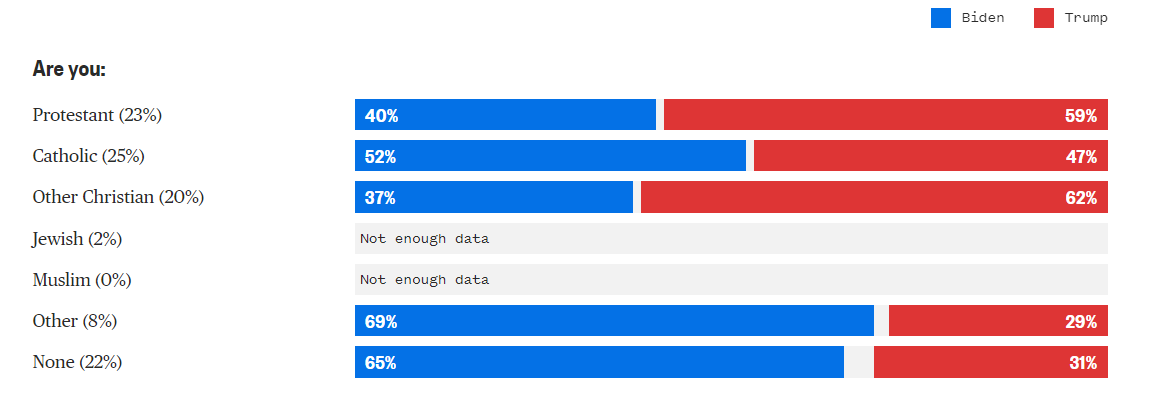
(2020 exit poll data, from NBC News)
Analysis by political scientist (and American Baptist pastor) Ryan Burge pulls out a few other categories worth noting from some different data about how people voted in 2020. Among non-White evangelicals, Biden actually won with 58%. Mainline Protestants were closely split, with Trump capturing 52% to Biden’s 47%. And Black Protestants went overwhelmingly for Biden, giving him 88% of their votes.
Clearly, Christians showing up on election day doesn’t inherently equal support for Trump.
The Pew Research Center found similar numbers, with Trump winning big among White Protestants but losing narrowly among Catholics. Their data also helps show what percentage of the electorate were Christians — that is, how visible were Christians for the candidates that day. Twenty-seven percent of the electorate were Protestants who voted for Trump, while another 10% of all voters were Catholics who voted for Trump. Meanwhile, 18% of all voters were Protestants who voted for Biden and 10% were Catholics who voted for Biden. Thus, while 37% of the electorate were Christians voting for Trump, another 28% were Christians who voted for Biden.
By tying his victory to Christians being visible on election day, Trump redefines the electorate in a couple of ways. First, he ignores nearly 45% of Christians as if they don’t count or aren’t real Christians because they don’t support a thrice-married politician indicted for trying to overturn an election, mishandling classified documents, and falsifying business documents to cover up that he paid women for sex. This attempt to define faith by voting choice is particularly problematic given how race is the bigger predictor of who people vote for. Trump won among White Christians but lost among Black Christians. His definition of “Christian visibility” thus harkens back to the old days when enslavers and segregationists pretended only White people counted as real Christians.
In addition to trying to ignore more than four in ten Christians, Trump’s rhetoric also excludes the one-third of voters who don’t identify as Christian. They shouldn’t be expected to participate in a so-called “Christian Visibility Day.” But they still count as fully American (and about one-third of them even voted for Trump). By casting the election day as a day to center Christians, Trump attempts to civically excommunicate one in three Americans.
Get cutting-edge analysis and commentary like this in your inbox every week by subscribing today!
This is the Day
As if Trump’s implication that Christians inherently vote for him wasn’t bad enough, his attempt to peg a “Christian Visibility Day” to the U.S. presidential election also ignores most of the world’s Christians. Transgender Visibility Day is observed internationally, always on March 31. It’s not tied to the concerns of those in just one nation. To elevate the U.S. presidential election as the day for “Christian visibility” not only overemphasizes a partisan election among Christians in the U.S. but also treats Christianity as an American sect. It would make as little sense as deciding to make “Christian Visibility Day” align with Bastille Day or Italy’s elections.
I don’t think we need a “Christian Visibility Day,” especially in the ways Trump called for it. His rant was based on false claims of persecution and fears of lessening cultural influence. If we were to have such a day, it should instead emerge from theological grounds, not a quest for political power. So if we must pick a date, I’d vote for Pentecost Sunday.
Found in Acts 2, the day of Pentecost saw the Holy Spirit descend on Jesus’s followers, leading others to hear them in their own languages. Peter then preached, and 3,000 were baptized.
Some preachers and scholars call this the birth of the Church. Others don’t go that far but still note its importance in the growth and public side of this fledging faith. Although not yet bearing the title of “Christian,” it is definitely the first big visibility day for Jesus’s followers after his ascension. That public side of the faith matters.
“Pentecost is political,” argued Rev. Leah Schade, a Lutheran minister and professor of preaching and worship at Lexington Theological Seminary. “I’m not talking about political parties or political affiliations — Democrats or Republicans, Independents or Libertarians. I’m talking about politics in its original sense: the concerns of the people. The Greek word polis means ‘citizenry.’ It’s about how we live and work and make decisions together as a community.”
Schade added that the early believers didn’t just stay in the upper room watching the dancing tongues of fire. Similarly, she added, Christians today should do more than “just sing our nice hymns and listen to the polite parts of Scripture” or “just say nice prayers and have coffee and donuts in the narthex when we’re done.” Pentecost calls Christians to be public.
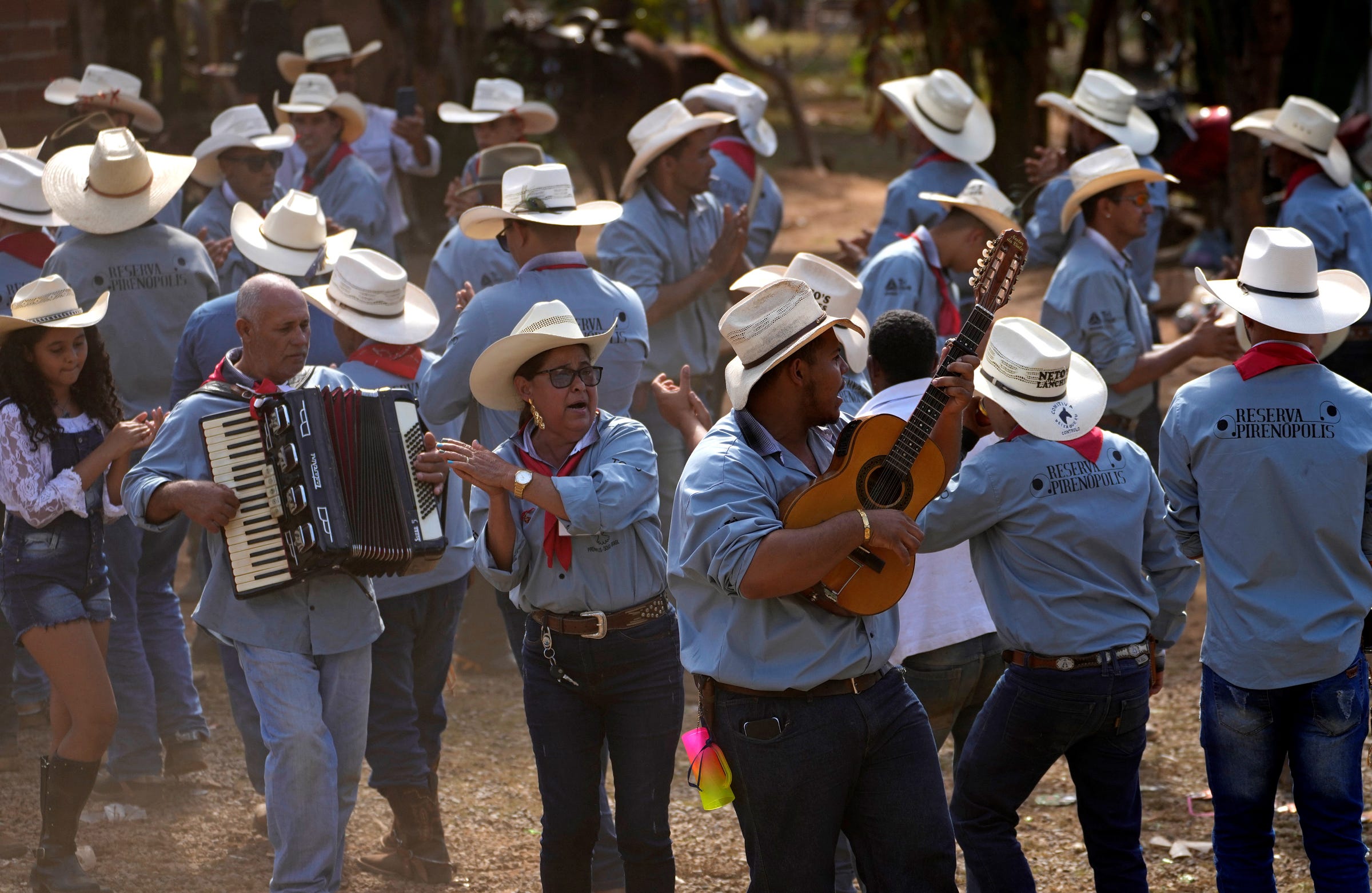
Musicians take part in the Folia do Divino Espirito Santo (or Feast of the Divine Holy Spirit), in Pirenopolis, Brazil, on May 28, 2022. The nine-day caravan celebrates the coming of the Holy Spirit on the day of Pentecost. (Eraldo Peres/Associated Press)
Additionally, Pentecost inherently pushes us to remember the global dimension of Christianity. Unlike the Christian Nationalism in Trump’s rhetoric, the biblical story highlights that people come to the faith from all languages and people groups.
“Pentecost invites us into a new way of engaging with difference — not just with different languages, but with all the ways we are marked as different from one another,” Rev. Isaac Villegas, a Mennonite pastor whose parents immigrated to the U.S. from Latin America, explained. “At Pentecost, the Holy Spirit speaks through the differences, without converting them into sameness. People aren’t invited to give up their languages, their cultures, and convert to the same way of speaking and thinking. The miracle of Pentecost is that God speaks through all the native languages — not that God speaks in a single language, a universal language, that is then translated. Through the Spirit, difference is made holy.”
This vision of listening to and celebrating the diversity among God’s people is one, Villegas noted, Christians haven’t always followed. Too often, church leaders have joined colonizing efforts to stamp out indigenous languages, destroy other cultures, and demand cultural and theological uniformity. But the biblical text calls us to a different way of being visible together as God’s diverse fellowship.
“In our social and political moment, we need Pentecost,” Rev. Keri Day, a professor of constructive theology and African American religion at Princeton Theological Seminary, argued during Trump’s presidency. “Hostility and bigotry characterize Christian churches, which have more of a tribal ethos, often ignoring or demonizing those who are different from them. Consider how Mexican immigrants are often depicted by President Trump’s administration, an administration that is supported by a record number of White churches. These immigrants are represented as criminal, lazy, and dangerous, in need of deportation to save the body politic. White ministers often suggest from pulpits that African Americans in urban areas are responsible for whatever injustices befall them because of their own sins, both personal and social.”
Far better than the day of a national election, Pentecost Sunday should remind Jesus’s followers what it means to be part of a public, global faith. It’s not about being visible in a quest for power. It’s about being visible together with love for God and our neighbors.
This year, that would be May 19 (except in the Orthodox communions, which calculate Easter and thus Pentecost differently, which is a real problem hurting a unified Christian witness). Naming this as “Christian Visibility Day” is unnecessary since Pentecost is significant enough on its own. But recognizing it as the true day for Christian visibility would help resist partisan efforts to redefine the focus of our faith. As Peter warned in his Pentecost sermon, “Save yourselves from this crooked generation.”
As a public witness,
Brian Kaylor

